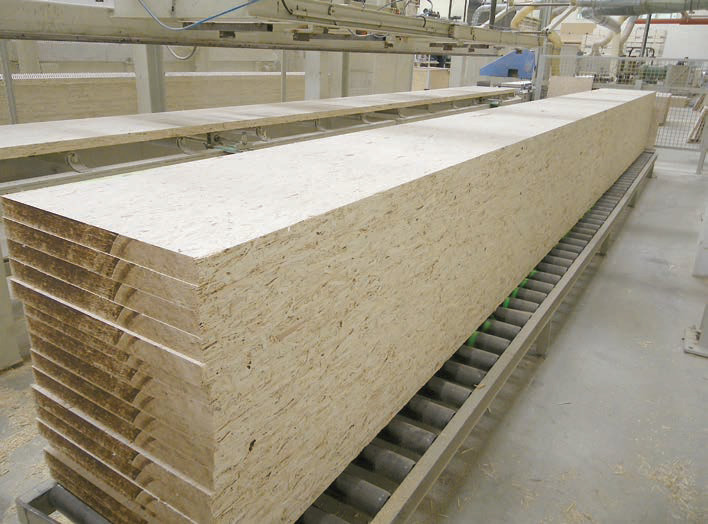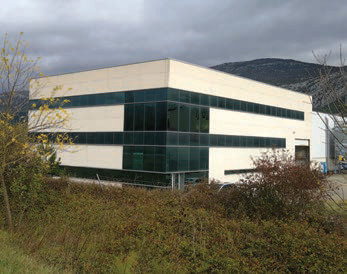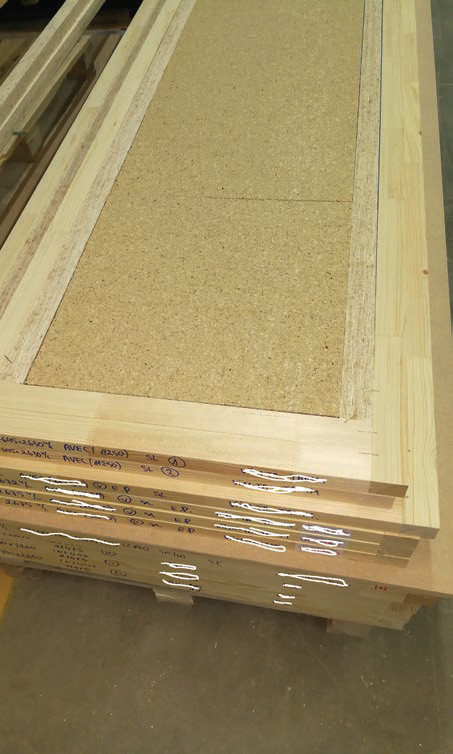Another Strand
26 November 2019European Laminated Strand Lumber (LSL) manufacturer Tabsal SCL has been investing in R&D at its Spanish base as it plans to make further inroads into new markets and applications. Stephen Powney reports
North America has had a big role in engineered wood product developments in the UK over the years.
Think Trus Joist, Boise and Louisiana- Pacific and the plethora of various products that have come to these shores over the years.
But I wonder how many people in the UK timber trade realise there is in fact a European producer of Laminated Strand Lumber (LSL) – Tabsal SCL, which produces the LignumStrand product.
It was something TTJ was not aware of, so we met up with Javier Saldise, technical and sales director of Tabsal SCL during his recent visit to London.
Mr Saldise’s family has a long background in timber products – his father and uncles have been involved for many years in door manufacturing in Spain as well as pioneering the European development of LSL.
His father Juan Antonio Saldise became general manager and MD of Spanish door manufacturer Carsal Industries back in 1968.
The business investigated branching out to composites in the 1990s – timber-plastic composites and LSL – eventually taking the decision to focus on LSL. Tabsal Composites de Madera was thus launched in 1999.
Carsal was sold to another Spanish door manufacturer in 2014 and subsequently in 2017 Mr Saldise senior took over the LSL operation as his own business – Tabsal SCL – together with his son, two daughters and a friend.
Javier Saldise explained to TTJ that the company is currently at an exciting stage in its development and that extensive R&D and product improvements have been made in the two years since the takeover of the operation. The name of LignumStrand, he added, was something the company wanted to make wider known.
Manufacturing process The specific nature of Tabsal’s manufacturing processes, which it had developed itself was, he said, crucial to the performance of the products.
The 2,500m2 Tabsal SCL factory is near Pamplona in northern Spain and has a full range of log handling, debarking, stranding, drying, gluing/blending, pressing and storage operations. Annual factory capacity is 40,000m3 on a 24/7 continuous production process.
Mr Saldise says LignumStrand is different to many other LSL products in several respects.
Long wood strands are oriented longitudinally and in one step, rather than the standard three steps. This, he said, resulted in the same quality material being in the faces and core.
The material is homogeneous and compact due to the pseudotrianglar section of the wood particle and the pressing and steam injection processes employed.
Product voids and differences between inner and outer layers are thus avoided, Mr Saldise added, and the end product actually resembles natural wood. “We are the only European manufacturer of LSL because it is a highly complicated process and most companies do not want to spend the time understanding the process.”
Spanish plantation-grown poplar wood, which has a good strength to weight ratio, is the feedstock and compares with beech and oak in its performance.
A further differentiating factor for LignumStrand is its use of isocyanate resins for gluing purposes, without formaldehyde which results in an E1 formaldehyde content classification.
Its LSL Planks are produced in 8200mm x 620mm sections and 30-90mm thicknesses, with cutting facilities available according to customer applications. The product range features versions with different densities – from 650kg/mm3 to 800kg/mm3.
Products and Markets Product applications include technical door stiffeners using SCL stiles, technical door core, stair strings/treads, beams, I-joists and drawer beams.
Furniture applications include living room modules, while it can also be covered in natural wood veneer and used as legs in tables and beds. LignumStrand has additionally found a market in production of pool tables – a very demanding application requiring high levels of product stability.
In the US timber construction industry, LSL is used for wall studs, lintels, rim board, base and top plates.
“The Spanish market for these products is very low,” explained Mr Saldise. “Our market is typically countries such as Germany, France, the UK and the Netherlands.”
Technical doors have been a strong market for the company, as manufacturers like the dimensional stability of the material and it is also cheaper than oak.
For many years Tabsal has been supplying the product to UK door manufacturers but never for construction applications such as rim boards and beams, as those applications required CE marking in place and it was a more complicated approval process.
“But from 2019 we have got the CE marking to use it in construction,” he added.
Mr Saldise said Tabsal had noticed that several North American engineered wood product manufacturers had left the UK market in recent years so there was an opportunity for the company to widen its applications in construction.
Its LignumStrand E 10700 and E 9500F (fire retardant) products have a Declaration of Performance (DoP) which show modulus of elasticity (face, parallel to grain) of 11.600 kN/mm2 and 10.600 kN/mm2 respectively, with bending strength of 39.6 and 34.4, also respectively.
The E 10700 rated product is, Mr Saldise says, equivalent to C40 strength graded timber, while low level of deflection is another quoted advantage.
“We are looking to be at the top of the market as it’s very hard to compete with cheaper products that don’t have similar performance,” he added.
In Germany it supplies the material as studs for timber framed housing, with the studs able to be used at 1.2m centres because of its superior strength.
In the door industry, Mr Saldise explained that LignumStrand’s fire performance meant doors could be made bigger without being penalised in the standards.
“People need a stable product in a fire door stile to keep the smoke out and you need a strong material in the middle to maintain the performance. But manufacturers and designers need to be educated, they do not have all this information.”
JELD-WEN and Masonite are among Tabsal’s big customers in Europe.
Product Development The material is produced in a range of different densities and feature various additives according to customer needs. Some of the products – E 9500F for example – have fire retardant added.
“The current focus on fire protection is the reason why we released this product,” said Mr Saldise.
The E 9500F product has a declared Reaction to Fire Class of C-s1, with a face charring rate of 0.44mm/min and edge charring rate of 0.50mm/min.
Innovation work in the Tabsal laboratories is continuing to bring additional performance benefits to the LSL range.
One piece of research involves inclusion of chemical additives to make the product even more stable – results have shown it is possible to reduce swelling when wet to less than 1%, although this method is currently very expensive to produce. Other testing is aimed at a less dramatic performance increase (swelling reduced to 9-10%) but more realistic cost base.
Strength testing and research has also shown it is possible to reach a modulus of elasticity performance of 14.1 kN/mm2.
So, with a new momentum behind the company, extensive R&D work currently ongoing and a desire to tap the large UK construction market, we may be hearing more of LignumStrand in the near future
With a further 4,000m2 of manufacturing space available at the factory for future expansion, Mr Saldise said Tabsal is gearing itself up to be a supplier of choice for multiple markets and product applications.


